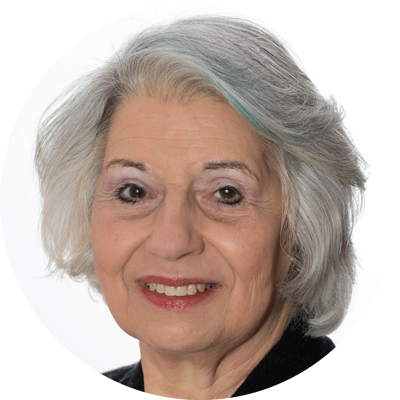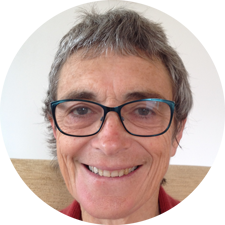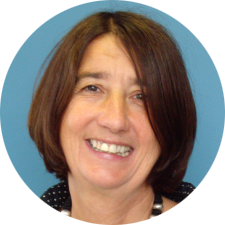

Sally is a Liberal Democrat member of the House of Lords. Appointed in 1991 she has held a number of front-bench positions, most recently Home Affairs including Immigration. She now chairs the Lords Select Committee on Justice and Home Affairs. She was a councillor in the London Borough of Richmond upon Thames, and Chair of the London Assembly (the Greater London Authority).
She is a Trustee of the Rose Theatre, Kingston and of Safer London which works to give young Londoners lives free from the threat of exploitation and violence. She chaired Refuge, the domestic violence charity, was a board member of the adoption agency Parents for Children, President of the Town and Country Planning Association, and is on an advisory board of Missing People. She is a solicitor and was a partner in Clintons which specialises in media and entertainment law.

Rabbi Baroness Julia Neuberger DBE is Chair of University College Hospital NHS Foundation Trust and Chair of The Whittington Hospital NHS Trust. She was Senior Rabbi of the West London Synagogue from 2011 until March 2020 and is now Rabbi Emerita. She is a cross bench Peer in the House of Lords, former CEO of the King’s Fund, and a founding Trustee of the Walter and Liesel Schwab Charitable trust, set up in memory of her parents. She was a Trustee of the Van Leer Group Foundation and Chairman of the Van Leer Jerusalem Institute. She chaired the Review of the Liverpool Care Pathway for Dying Patients in 2013 and was Vice Chair, Mental Health Act Independent Review 2017-2018. She is also a member of the Executive Board, Leo Baeck Institute London and she is a Trustee of the Rayne Foundation, she is Chair of Independent Age and is a Commissioner of the UK Commission on Bereavement and of the Commission on the Integration of Refugees. She has also recently become a Trustee of Yad Hanadiv (Charitable Foundation). Her latest book on Antisemitism ‘What it is. What it isn’t. Why it matters’ (Orion Books) was published in May 2019. She is currently working on a book on pain and how we approach pain relief.

Anthony Neuberger is Emeritus Professor of Finance at Bayes Business School, City University London. His research interests include financial derivatives and pensions policy. Prior to joining Bayes he held academic positions at Warwick University and London Business School. After graduating from Cambridge University with a degree in Maths and Philosophy, he worked for the Central Policy Review Staff (the Think Tank) and then went to the Department of Energy. He has long been interested in refugee and asylum issues, and served as a Trustee of the Refugee Legal Centre.

Sheila studied Sociology and Politics at Sussex University. She worked for the Runnymede Trust, an independent race equality think-tank, and taught English to immigrants who had recently arrived in England. She now lives in Ireland, where she worked in the library of University College Cork until her retirement.
Ilse Westheimer arrived in London from Germany in 1939 at the age of seventeen, leaving her mother behind. She never saw her again. Sheila’s parents employed Ilse, and made life-long friends with her. Sheila stayed in contact with Ilse during her career as a social worker and until her death. Ilse asked Sheila to take over her role as a trustee.

Katie Petty-Saphon is the Chief Executive of the Medical Schools Council. Her secretariat also supports the Dental, Pharmacy, Veterinary and Healthcare Science Councils in addition to the Association of UK University Hospitals. Katie studied Natural Sciences at Cambridge, has a PhD from Birmingham and then worked in industry for many years.
She has been both a school and a university Governor and the deputy chair of an NHS Trust. She was Chief Operating Officer for Sir John Tooke’s acclaimed Independent Inquiry into Modernising Medical Careers, is a Trustee of the UK Clinical Aptitude Test Consortium, and immediate past President of the Associates of Newnham College, Cambridge.

Dr Rebecca Murray is a Lecturer in Sociological Studies teaching across Sociology and Social Work at the University of Sheffield, where she is a member of the institution’s Sanctuary steering group and the Migration Research Group. Rebecca’s extensive practice and research in relation to bordering and post compulsory education developed from young migrant-led grassroots campaigning and advocacy initiatives. Rebecca sits on the national University of Sanctuary steering committee, following the merger of the Article 26 project, which she founded, working in partnership with UK universities to create scholarships for students marginalised as the result of their immigration status. In 2002, she qualified as a Welfare Rights Officer with expertise in the rights and entitlements of people aged 19 and under. Rebecca spent over 10 years working in the third sector with Save the Children, where she specialised in research, advocacy and working in participation with young people experiencing forced displacement and / or severe and persistent poverty.
Borders and bordering practices in post-compulsory education were the focus of Rebecca’s doctoral thesis: ‘Navigating the Higher Education Border: Routes to Belonging for Forced Migrant Students in the UK & Sweden’, a comparative study exploring the role of universities in mitigating and exacerbating the marginalisation experienced by displaced students in the UK and Sweden. Subsequent research ‘Forced Migrants in Higher Education: ‘Sanctuary Scholarships’ in a Hostile Environment’, has been published in the Journal of Ethnicity & Migration Studies and Migration & Society. Rebecca’s current project ‘(Re)imagining the Higher Education Border’ (funded by a British Academy small grant), seeks to quantify the higher education border and facilitate a (re)imagining of its scale and impact in participation with young people with experience of displacement.In 2016, Rebecca was awarded an honorary fellowship by the University of Winchester, and in 2019 an honorary doctorate from Keele University.
Walter and Liesel Schwab
Walter Schwab was born in the UK, the son of German Jewish immigrants who came before the First World War. His mother chaired the welfare committee of the Jewish Refugee Committee before the Second World War- she worked day and night to get Jews out of Germany, and Walter helped her until he volunteered for the army in 1939. Liesel Schwab was herself a refugee from Nazi Germany, arriving aged 22 in 1937. She was much helped and generously supported by strangers and friends alike in Birmingham and London. Her own brother was a child refugee who arrived in 1938, so she knew the trauma and stress leaving home and family could cause. Both Walter and Liesel Schwab had sufficient personal experiences to empathise with present day refugees and asylum seekers, and they believed passionately in helping people who were poor, disadvantaged, and/or unpopular. So the Schwab Trust was set up in their name, to help support and educate young refugees and asylum seekers, in the spirit of their own lives.
Ilse Westheimer
Ilse Westheimer was born in Frankfurt am Main, Germany in 1921. Her father was a shoe manufacturer and gave an annual gift of shoes to an orphanage, even when his business was suffering at the hands of the Nazis. Ilse inherited from him her dedication to help others. She arrived in London in May 1939, shortly before the Second World War broke out, and a few years before her eighteenth birthday. With very limited funding, she qualified as a social worker at Glasgow University and afterwards at the London School of Economics. She was awarded a Fulbright Scholarship to study in New York. She was a very successful social worker, and trainer of social workers,
She wanted to help others who found themselves in the same position that she was in when she arrived in Britain. Shortly before she died, she read about the Schwab Trust, and after meeting Baroness Neuberger, they decided that the Westheimer Trust should be run in conjunction with the Schwab Trust.
The aims of the trusts
:- To promote and encourage the education of young asylum seekers and refugees
.- To make the wider community aware of the considerable effort and achievement of young asylum seekers and refugees
.- To encourage a positive public perception of these young people.
The principle methods by which we hope to accomplish these aims:
i. By providing financial assistance towards education;
ii. By promoting positively their achievements through the provision of awards.
We are committed to protecting your data and privacy and our privacy policy outlines how we do this. Please get in touch with us if you have any questions via email to info@swtrust.org.uk. Click here to read our privacy policy.